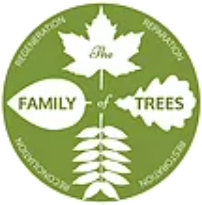In the heart of the sprawling Twin Cities metro area, there exist many well-hidden green spaces where you can join other area residents on a full moon canoeing excursion, feed wildlife, help biologists with animal field studies, take a class on Giant Cecropia Moths, or learn about gardening with native plants. These activities comprise just a brief sample of the environmental education events going on around the Twin Cities in a single month. Along with a dynamic science museum, our area boasts over seventeen Environmental Learning Centers (ELCs), where staff and volunteer naturalists lead excursions and teach classes.
Environmental education’s goal is to promote knowledge and understanding of the natural world among its human citizens through discussion and meaningful experiences. Even in this large urban area, we are surrounded by wildlife and plants. We are still part of an ecosystem, and we do have a relationship with the natural world. Even in the city, we can still open our eyes and ears to the environment. Go on a nature walk, join in a canoe trip and observe birds and animals in the neighborhood. Nature education can take place anywhere – at home, in the classroom, on a walk around the neighborhood, at an environmental learning center or on a camping trip in one of Minnesota’s many wilderness areas. In any form, environmental educators provide people with meaningful experiences in nature. Environmental education has also entered the traditional classroom. Many teachers use resources such as Project Learning Tree, an activity guide that combines lessons about the environment with math, science, reading and writing. From kindergarten forward, students can hone their analytical, teamwork, and research skills through activities and games about forests, wetlands, animals and pollution.
Environmental education is not a new idea. Under the subject of “nature education,” library books date back to the mid-1800s. As long as people have been interacting with their environment and have shared their knowledge with others, environmental education has taken place. What is relatively new is the way in which it fits into our lifestyle. Today, most people in our society have lifestyles that conceal the ways in which we are dependent on our natural environment. We must actually work to open our eyes to the world around us.
For this reason, environmental education is one of the cornerstones of sustainable communities. A child with no understanding of nature will most likely become an adult who does not value the environment. Accordingly, a person who has had meaningful experiences in nature and who understands how he or she is intimately connected to the natural world will want to preserve it.
Environmental education benefits the community in several ways. Aside from promoting sustainability, nature excursions can build community. People share experiences and make connections to one another. Shared green space also helps to create a sense of togetherness. For children and adults, nature education experiences or challenges can build confidence. Wilderness Inquiry, a national organization with an office in the Twin Cities runs wilderness trips such as kayak, canoe and dogsled excursions for people of all abilities, particularly for those with disabilities.
For children and adults, nature education experiences can help develop confidence and a sense of wonder. Some of my most striking memories come from experiences in the outdoors. While volunteering at the Audubon Center of the Northwoods this past winter, I helped a group of fifth-grade students from an urban St. Paul school on their first snowshoe hike. Most of these kids had never been on snowshoes before, and few thought they would find much to see in the middle of the woods on a bitter cold, snowy afternoon. During the three-hour hike, they examined bobcat paw prints and learned the names of trees. I found myself with a group of three students who were cold and tired and frustrated with their awkward footwear. As we rounded a bend in the trail, we came upon two does. Both kids and animals froze and stared at each other. After a long unblinking moment, the deer started and bounded away through the woods. When they returned to the warm lodge, the exhausted kids couldn’t wait to tell their teachers and classmates what they had seen. These kids challenged themselves and learned about what valuable surprises can be found even in a small area of wilderness. Hopefully, that’s a lesson they won’t soon forget.
You can get involved by taking a class, going on an excursion or volunteering to help out with environmental education events. Most of the Twin Cities area ELCs offer weekend or weekday classes, workshops, outings and multi-day camp events for children, families, and adults. Many other ELCs cover the rest of the state, including the well-known Wolf Ridge Center and Audubon Center of the Northwoods. To find out about activities in your area, contact your local ELC or check out the Sharing Environmental Education Knowledge (SEEK) web site. This site displays a two-month calendar of environmental education events for every region of the state.
Environmental education is healthy for people and the environment. In these times of the internet and television, we need to be reminded that we all live in a community and that our community exists in relation to the environment.
Environmental Learning Centers in the Twin Cities:
Bell Museum of Natural History Gordon Murdock, Museum Curator 10 Church St. SE University of Minnesota Minneapolis, MN 55455 612-624-7083 www1.umn.edu/bellmuse
Dodge Nature Center 365 Marie Ave W W. St. Paul, MN 55118 651-455-4531
Lee & Rose Warner Center 15375 Norell Ave. North Marine on St. Croix, MN 55047 651-433-2427
St. Croix National Scenic Riverway P.O. Box 708 St. Croix Falls, WI 54024 715-483-3284
Springbrook Nature Center 100 85th Ave NE Fridley, MN 55432 763-572-3588 www.springbrooknaturecenter.org
Staring Lake Outdoor Center 8080 Mitchell Road Eden Prairie, MN 55344-4485 952-949-8479
University of Minnesota Landscape Arboretum 3675 Arboretum DR Chaska, MN 55318 952-443-1400 www.arboretum.umn.edu
Vinland Centerv PO Box 308 Loretto, MN 55447 763-479-3555 www.vinlandcenter.org
Westwood Hills Environmental Education Center 8300 W Franklin Ave St. Louis Park, MN 55426 952-924-2544 www.stlouispark.org
Coon Rapids Dam Regional Park East Visitor Center 9750 Egret Blvd Coon Rapids, MN 55433 763-757-4700
Wargo Nature Center 7701 Main Street Hugo, MN 55038 651-429-8007
Eastman Nature Center 13351 Elm Creek Rd. Osseo, MN 55369 763-420-4300
French Regional Park 12605 County Road 9 Plymouth, MN 55441 Naturalist: 763-559-7932
Lake Minnetonka Visitor Center Lake Minnetonka Regional Park 4610 County Road 44 Minnetrista, MN 55364 952-474-4822
Richardson Nature Center 8737 E Bush Lake Road Bloomington, MN 55438 952-941-7993
West Coon Rapids Dam Visitors Center Suburban Hennepin Regional Park District 10360 West River Rd Brooklyn Park, MN 55444 763-424-8172
| What You Can Do
* Get involved. * Learn from others and share your knowledge. * Support and enjoy your local ELC. * Get out there and appreciate Minnesota’s amazing natural diversity. * Take a walk in the woods and take a friend! |
Project Learning Tree Environmental Education Activity Guide, published by American Forest Foundation
Project Wild Activity Guide, Published by the Council for Environmental Education
Project Wet Activity Guide, Published by The Watercourse and the Council for Environmental Education







